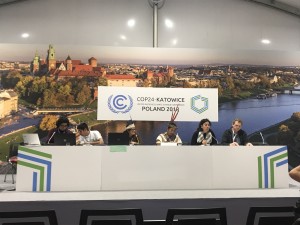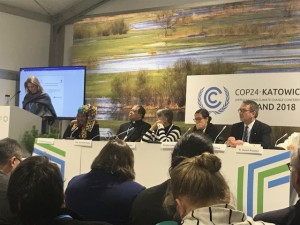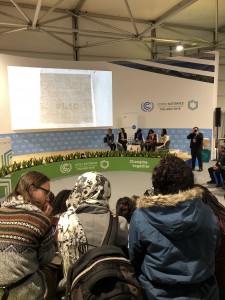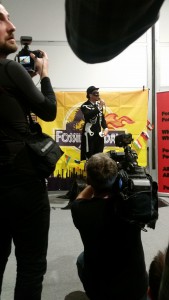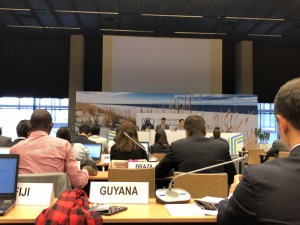This afternoon, I attended two extremely interesting side events that focused on incorporating Indigenous rights in the language and implementation of the Katowice Rulebook (the goal of this COP is to establish this Rulebook to actually implement the commitments set forth in the Paris Agreement). The first event, titled “Realizing the Vision of Paris: Incorporating Rights in the Implementation Guidelines,” consisted of panel members from the Center for International Environmental Law (CIEL), Earthjustice, Women’s Empowerment and Development Organization (WEDO), Amnesty International, and Asia Indigenous Peoples Pact (AIPP).
The most impactful speaker in my opinion was a man representing AIPP, who emphasized how Indigenous Peoples face impacts from not only climate change, but also the mitigation and adaptation measures designed to address it. One example is the expansion of protected areas — a measure designed to protect forests and their crucial role as carbon sinks. While seemingly wonderful, in acquiring additional land to expand the reach of protected areas, this approach displaces Indigenous Peoples and strips them of their access to ancestral lands and culturally significant resources.
One of my greatest passions with respect to environmental protection and social justice is the exact issue of how conservation initiatives affect Indigenous Peoples. While I have previously focused a great deal on this in terms of existing national parks and protected areas, I had not thought about these issues in terms of the climate-related expansion of these initiatives It was eye-opening to learn about the flaws and inequity of seemingly good solutions to the climate crisis, and this event really expanded my understanding and altered my perspective of currently proposed mitigation and adaptation initiatives, including REDD+ and other carbon offset schemes.
After this panel, I went to another side event, titled “Megadrivers, Climate Funds, and Indigenous Peoples.” This event was organized by representatives from several Indigenous Peoples organizations in Peru. Each of the speakers emphasized the urgency of the challenges that they are facing in the Amazon and how integral it is to maintain and ensure Indigenous control of their territories. This event detailed several climate funds that exist in the Amazon, including the DGM, FCPF, FIP, ONU REDD, and DCI. The panelists discussed the current problems that exist with respect to these funds, including the prioritization of state mediation, the lack of inclusion of Indigenous Peoples in these conversations, and the state’s continued support for extractive industries and anti-climate investments (i.e., agribusiness, hydrocarbons, mining, wood felling). The panelists then discussed some experiences and achievements of Indigenous Peoples with respect to land titling, reduced deforestation due to resistance to extractivism, investment in Indigenous economies with standings forests, and Indigenous REDD+. The event concluded by proposing Indigenous alternatives on climate finance, which highlighted the importance of territorial organizations and learning from previous Indigenous-centered successes.
Another interesting thing to note about this event is that it was entirely in Spanish, which I found very exciting and powerful because most other side events are held in English; it was clear that this event was focused on the people who it was trying to reach, and in asserting the rights (and language) of the panelists, rather than submitting to the sense of Western, English, and American superiority that is so pervasive at these negotiations.
Coming out of today, I am extremely interested in learning more about just and viable alternative approaches to mitigating and adapting to climate change without perpetuating colonialism and human rights violations with respect to Indigenous Peoples, as well as how such mechanisms and financing can be used to uplift and support Indigenous Peoples in implementing their own self-driven initiatives. Stay tuned as I continue to investigate these crucial questions this week!
— Shana
